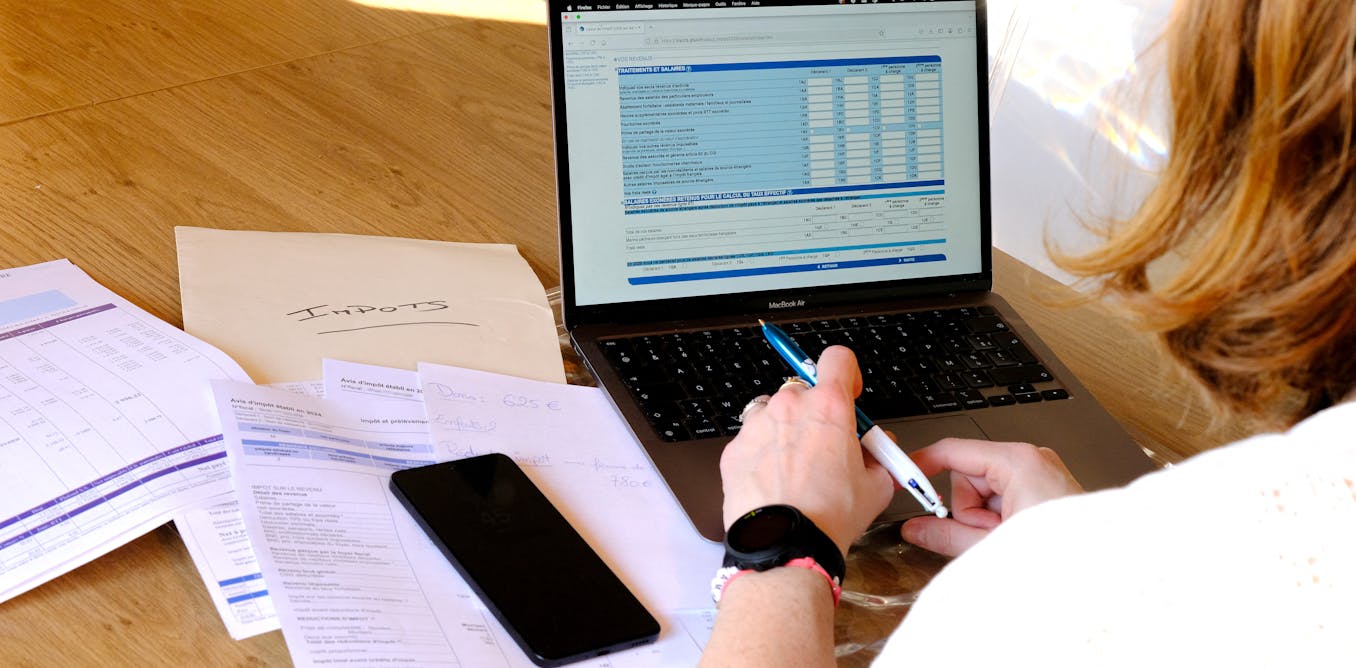American families are struggling to keep up with their bills.
The cost of food soared by more than 23% from 2020 to 2024. Other price increases, which are especially steep for vehicles, insurance, child care and housing, come as nearly 40% more people are behind on their credit card payments than in 2022.
Now, uncertainty arising from zigzagging tariffs, firing of tens of thousands of federal workers and contractors, and massive cuts and freezes to federally funded programs means that more people are increasingly pessimistic about the economy.
As an assistant professor of social work, I have found through my research that differences in how people experience, behave toward and feel about their personal finances have as much of an impact as do their age and gender on certain financial decisions. And those decisions, in turn, can affect their income and wealth moving forward.
Improving your ‘financial efficacy’
Scholars like me use the term “financial efficacy” when we’re assessing whether someone has personal finance know-how and the ability to put it to good use. People with a high level of financial efficacy can be more able to weather bouts of financial hardship and build wealth.
Although everyone’s situation is unique and individual resources vary, there are still five broad areas that personal finance experts say are linked to good financial outcomes: emotional regulation, problem-solving skills, an ability to achieve goals, self-confidence and risk management.
1. Being calm and carrying on
Remaining calm in the face of a potential – or real – financial crisis tends to make it easier to think through important decisions. In contrast, reacting out of fear often leads to mistakes or quick fixes with costly long-term consequences. For example, rushing to fix a problem could lead you to take out a pay-day loan with high interest rates and fees.
That’s why you should avoid making big financial decisions in a hurry.
Waiting until you feel calm, perhaps giving yourself 24 hours to think it over, can protect you from making a bad situation worse. But don’t wait too long – procrastination can lead to late fees and compound your problems.
Keeping your emotions under control depends on having healthy coping mechanisms for stressful situations. And having healthy habits helps to manage that stress.
Photo by Jeff Gritchen/Digital First Media/Orange County Register via Getty Images
2. Problem solving with some creativity
Solving financial problems is an exercise in improvisation. This includes finding creative ways to increase your income through a new job or side hustles and to reduce your expenses. Or look for solutions that will buy you more time, such as negotiating a repayment plan for an outstanding bill.
This perseverance and resourcefulness often requires relying on skills you’ve used in the past. And it may help if you seek advice from people who you know have made good financial choices before.
When in doubt about how to solve a financial problem, go see a financial counselor or social worker who can help assess your situation and identify the next steps. But be wary of the so-called finfluencers – short for financial influencers – who are active on social media. Instead, learn from the experts who focus on consumer protection and unbiased education.
3. Setting goals and keeping track of them
Achieving goals can be a short-term activity, like solving an immediate problem, or a longer-term process. It means keeping a clear outcome in mind and being able to tell when you’ve met a goal. More complex goals may need to be broken down into multiple milestones to stay on track.
Whenever you’re in deep financial trouble, try to closely monitor your income and expenses. Adapt your budget according to what’s important to you. This will increase your sense of control over the situation.
Tally up all your debt, including from credit cards, autos, student loans, medical or utility bills, and home mortgages. Figure out what you owe and to whom, and put together a plan to repay them. And if this feels overwhelming, that’s OK: A credit counseling nonprofit can help walk you through the process.
Listing all your debt on paper or in a spreadsheet helps reduce anxiety and fear of the unknown. Having the plan helps you see a real way toward a financially stronger future. Then, take action and start paying them down.
One possibility is to ask creditors for an extension or modified repayment schedule for a mortgage or car loan. Communicating with them up front shows them you are taking responsibility, and they will be more likely to work with you.
Americans now owe an average of $6,455 in credit card debt. Paying in full during the grace period instead of later, with interest, can result in a substantial difference in what you owe.

Faga Almeida/Universal Images Group via Getty Images
4. Gaining more self-confidence through practice
It’s always easier to be confident that you can achieve something if you’ve done it before. This is how confidence builds on itself.
But what if you’re in a new situation? It can help reflecting back on your personal history, realizing that you’ve met challenges in the past, and being reasonably assured that you can do it again. Such confidence then helps you keep calm, think through some solutions and see that you can achieve your goals.
Improving your money management confidence and skills can reduce your anxiety and stress in the moment. It can show you those areas of your financial life that are within your control and illumine the way forward to a healthier financial future.
5. Planning ahead reduces your risks
Even if your finances are OK today, I would advise you to plan ahead. It’s important to identify your own informal safety nets before you need them.
Let’s say you had to pay an unexpected $400 bill. How would you handle it?
Would you call a friend or a relative? Have that amount saved up, ready and waiting for emergency use? Cover it with your income? According to the Federal Reserve, only 63% of Americans could cover a $400 financial shock with the cash they have on hand.
By regularly setting aside some of the money you earn, you can simultaneously manage your risks better and develop the skills to achieve bigger goals.
Managing your own financial risks means doing your best to prevent a bad situation from getting worse. It also means you might be able to prevent a catastrophe in the future or be able to deal with it better.
Having insurance policies, such as life and disability, homeowners or renters, and health and auto, is part of this. But so are maintaining enough savings to cover an emergency or having multiple income streams.
The steps you take can also include something less tangible, such as caring for your health or tending to your relationships with friends and relatives so you can call on them when times are truly tough. Or better yet, they’ll be able to call on you.



